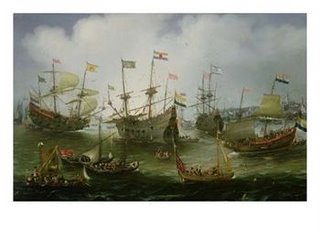 |
| Colonial Merchant Ships |
The British were the last to arrive in the European succession game. The Portugal were led by Vasco-da-Gama, then the Dutch and the French followed. In the power game it was the British through East-India Company, who captured power. They slowly expanded their empire with the help of Indian soldiers. Indians joined the East-India company army solely for the reason they recieved salary on first of every month, which no other Indian king was doing.

The British rule lasted 150 years and their main idealogy was to resist indianisation and complete assimilation into Indian society. Initially in 18th century they went native and called themselves nabobs. They dressed like indians, ate indian food and married indian women and lived in Indian style houses. After the abolition of the East-India company rule they chose to build Europeanised cantonments away from the crowded Indian cities. Here they lived in spatious British bungaloes in grand isolation and the local 'white's only' gymkhana clubs became their cultural centres. Even in this tropical climate they struck to European mode of dressing in early 20th century. Most of them never bothered to learn any Indian language properly. Their Hindi was often good enough for their servants and cooks.
 |
| Old Steam Engine at Nagpur Station |
The British rule introduced European education in India. The knowledge of English was essential to get a job in the British bureaucracy, in the British trading firms and of course in the British army at the officer's level. Many noble concepts like parliamentary democracy, the European scientific ideas, industrialisation and
 |
| Srinivasa Ramanujam |
 |
| Young Gandhi back from Africa |
 The intellectual and spiritual slavery giving rise to an inferiority complex shows the moral bankrupcty of the nation. This can be eradicated only through proper value based education. At present a degraded educational system is catering to the needs of millions of young men and women. They are coming out of Indian Universities in total ignorance of their cultural history, classical music, dance, literature and Indian science. This degenerate and denatured generation has become like putty in the hands of western manipulators. It has become the dream of an average Indian to either go abroad and settle down and if this is not possible and live like a wog (westernised oriental gentleman) in India. That is why there are no takers for Indian classical music and dance. For these people Hindu religion is nothing but a series of festivals meant to be enjoyed. The serious aspects of Hindu philosophy escape their notice. How can anybody be termed educated, if they do not even have a nodding acquaintance of Indian literature in a regional language. No amount of Harry Potter, Ludlum or Forsyth is no substitute for true Indian literature which mirrors Indian life. A nation, which is not proud of itself and forgets its own roots is destined to become a desolate desert, which is nothing but a dumping yard for International cultural garbage.
The intellectual and spiritual slavery giving rise to an inferiority complex shows the moral bankrupcty of the nation. This can be eradicated only through proper value based education. At present a degraded educational system is catering to the needs of millions of young men and women. They are coming out of Indian Universities in total ignorance of their cultural history, classical music, dance, literature and Indian science. This degenerate and denatured generation has become like putty in the hands of western manipulators. It has become the dream of an average Indian to either go abroad and settle down and if this is not possible and live like a wog (westernised oriental gentleman) in India. That is why there are no takers for Indian classical music and dance. For these people Hindu religion is nothing but a series of festivals meant to be enjoyed. The serious aspects of Hindu philosophy escape their notice. How can anybody be termed educated, if they do not even have a nodding acquaintance of Indian literature in a regional language. No amount of Harry Potter, Ludlum or Forsyth is no substitute for true Indian literature which mirrors Indian life. A nation, which is not proud of itself and forgets its own roots is destined to become a desolate desert, which is nothing but a dumping yard for International cultural garbage.
No comments:
Post a Comment